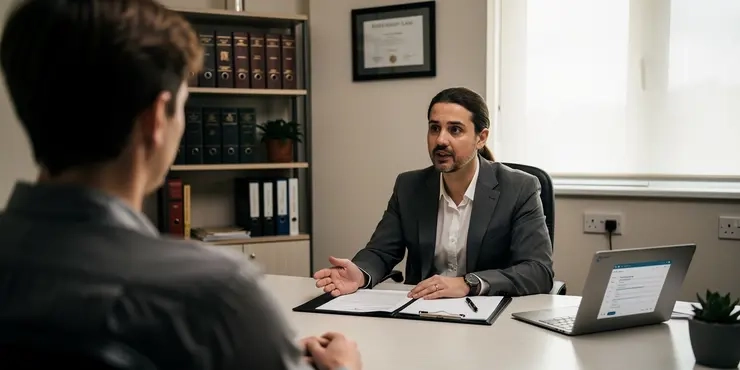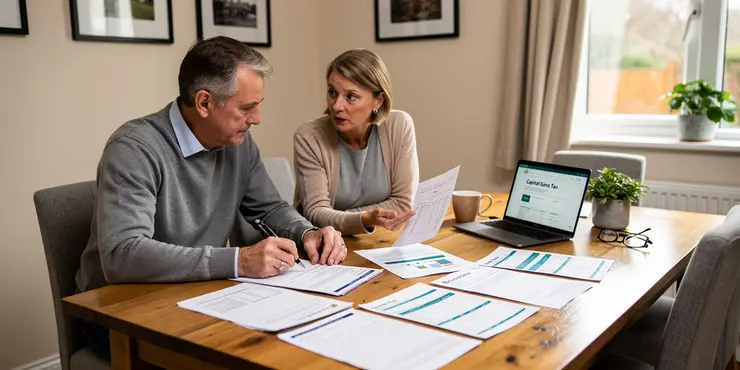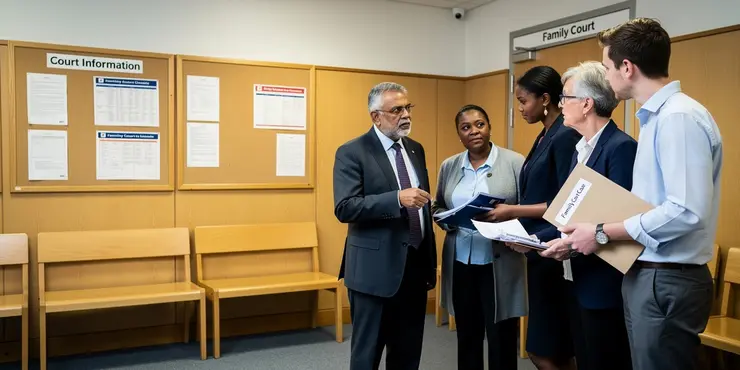Find Help
More Items From Ergsy search
-

Divorce Step By Step - Form E - Capital
Relevance: 100%
-

A Guide to the Divorce Process
Relevance: 51%
-

NO FAULT DIVORCE (What is there to know)
Relevance: 49%
-

Divorce UK (England and Wales) | UK Divorce Process and Overview Explained PART 1 | BlackBeltBarrister
Relevance: 48%
-

I'm Getting a Divorce | Tips From a Divorce Lawyer
Relevance: 48%
-

Divorce UK: What happens with the money in a divorce?
Relevance: 47%
-
Are there any new requirements for divorce filings in 2026?
Relevance: 45%
-

Ultimate Guide to Financial Disclosure on Divorce in the UK
Relevance: 44%
-

Understanding Your Rights in Divorce Proceedings
Relevance: 43%
-

Can firefighter pension benefits be divided in a divorce?
Relevance: 43%
-

Understanding Your Rights During Divorce Proceedings in the UK
Relevance: 40%
-

What is Capital Gains Tax (CGT)?
Relevance: 40%
-

The 4 Steps to Agree a Financial Settlement on Divorce UK
Relevance: 40%
-

Are there expected changes to capital gains tax in 2026?
Relevance: 38%
-

Are there specific forms required for reporting CGT on property disposals?
Relevance: 37%
-

Divorce - How To Rebuild Your Life After Losing Everything
Relevance: 37%
-

What tax rate applies to capital gains from property sales?
Relevance: 36%
-
How do I report and pay Capital Gains Tax on property disposals?
Relevance: 35%
-

How do I pay the Capital Gains Tax after reporting the property disposal?
Relevance: 34%
-

Is Ozempic a form of insulin?
Relevance: 31%
-

What forms does CBD come in?
Relevance: 29%
-

Registration of Interest Form | UK Adoption Journey
Relevance: 29%
-

What forms do I need to complete for Inheritance Tax?
Relevance: 28%
-

What forms can honour based abuse take?
Relevance: 26%
-

Is Paillon treatment a form of chemotherapy?
Relevance: 26%
-

Can fake weight loss drugs come in unusual forms?
Relevance: 25%
-

What is a P800 form and how does it relate to my tax refund?
Relevance: 25%
-

Is road rage a form of dangerous driving?
Relevance: 23%
-

What is capital gains tax in the UK?
Relevance: 22%
-

What is Capital Gains Tax (CGT)?
Relevance: 22%
-

Can the digital license be used as a form of ID for non-driving purposes?
Relevance: 21%
-

Can I offset losses from other properties when calculating my CGT?
Relevance: 20%
-

How do I report a property disposal to the tax authorities?
Relevance: 20%
-

Why doesn't the UK have a wealth tax?
Relevance: 20%
-

The Family Court without a Lawyer
Relevance: 19%
-

What is the wealth tax in the UK?
Relevance: 19%
-

Navigating Post-Divorce Finances Amidst Economic Challenges
Relevance: 19%
-

The Family Court without a Lawyer - Video 1 of 3
Relevance: 18%
-

What forms do I need to complete for Inheritance Tax?
Relevance: 18%
-
Are there any changes to spousal support regulations in 2026?
Relevance: 17%
Divorce Step By Step - Form E - Capital
Introduction to Form E
Form E is an essential document used in the United Kingdom during divorce proceedings to achieve a fair financial settlement between parties. This financial statement provides a comprehensive overview of each party’s capital, income, outgoings, and other personal financial details. It ensures transparency and allows the court to make informed decisions regarding asset division, maintenance, and any other financial matters.Filling Out Form E
Completing Form E correctly is crucial. The form is divided into several sections, each requiring specific information: 1. **Personal Information**: Include basic personal details such as names, addresses, and dates of birth. 2. **Financial Information**: Detail all sources of income, including earnings, investments, and benefits. 3. **Capital and Assets**: Declare all properties, savings, pensions, and other investments, along with their current values. 4. **Liabilities and Debts**: List any outstanding debts, including mortgages, loans, and credit card balances. 5. **Outgoings**: Provide a breakdown of regular expenses such as household bills, childcare, and personal spending.Documentation Required
Supporting documents are a key part of Form E. These may include: - Bank statements (typically from the last 12 months) - Payslips - Property valuations - Pension details - Mortgage statements - Existing financial agreements (if any) These documents substantiate the information provided and assist the court in verifying the financial standing of each party.Submission and Review
Once completed, Form E should be signed, dated, and submitted to the relevant court handling your divorce case. Copies must also be served to the other party involved in the divorce. The court will then review the submissions and determine if further financial disclosure or investigation is required. Both parties may be asked to attend a Financial Dispute Resolution (FDR) appointment to negotiate a settlement before any court hearing.Legal Assistance and Accuracy
Accurate completion of Form E is vital. Any discrepancies or omissions can result in delays or unfavorable outcomes. It is highly recommended to seek legal assistance from a solicitor or a legal advisor specializing in divorce and family law. They can provide guidance, help ensure all necessary details and documents are included, and represent your interests throughout the process.Conclusion
Form E is a comprehensive document designed to facilitate fair financial settlements in divorce proceedings within the UK. By providing detailed and accurate financial information, each party helps to ensure that the court can make just decisions regarding the division of assets and financial responsibilities. Proper completion and submission of Form E, supported by relevant documentation, can significantly streamline the divorce process and help achieve equitable outcomes for both parties.Divorce Step By Step - Form E - Capital
Introduction to Form E
Form E is a comprehensive document required in divorce proceedings in the United Kingdom when financial matters need to be resolved. This document, often daunting due to its detailed nature, serves the purpose of providing full financial disclosure between divorcing parties. It's a crucial step in ensuring that both parties have a transparent understanding of each other’s financial situation to reach a fair settlement.When to Use Form E
Form E should be completed and exchanged by both parties before the first appointment (often referred to as the First Directions Appointment or FDA) in financial remedy proceedings. This form is vital when there are disputes over financial settlements or when the court's intervention is deemed necessary to resolve financial disputes during a divorce.Sections of Form E
Form E is divided into several sections to cover different aspects of financial disclosure: - **Section 1: Personal Details** - This section captures basic personal information such as names, addresses, marriage details, and children involved. - **Section 2: Financial Details** - Here, you’ll disclose all income and expenditures, including salary, benefits, and living costs. - **Section 3: Assets** - This crucial section deals with the disclosure of all assets, including property, savings, investments, and pensions. - **Section 4: Liabilities** - Any debts, loans, and other liabilities are reported here to give a full picture of financial obligations. - **Section 5: Other Financial Information** - This includes details on any significant financial events expected in the future or any other information that could affect the financial settlement.How to Complete Form E
Completing Form E requires attention to detail and honesty: 1. **Gather Documentation** - Collect all necessary documents such as bank statements, pay slips, mortgage statements, and pension valuations. 2. **Fill in Personal Details** - Complete the straightforward demographic information in the initial sections. 3. **Itemize Income and Expenditures** - Carefully outline all sources of income and expenditure with supporting documents. 4. **Disclose Assets and Liabilities** - Provide comprehensive details of all financial assets and liabilities. Include any supplementary documentation. 5. **Review and Double-Check** - Before submitting, review the form to ensure accuracy and completeness.Legal Advice and Support
Given the complexity of Form E, seeking legal advice is highly recommended. Family law solicitors can guide you through the process, ensuring that all required information is accurately documented. Moreover, they can assist in interpreting any discrepancies or complicated financial structures.Filing and Exchanging Form E
Once completed, Form E must be filed with the court and exchanged with the other party's Form E. This exchange allows both parties to have a clear picture of each other's financial status, facilitating a fair negotiation or court ruling.Conclusion
Form E is a fundamental component in the financial settlement process of a divorce in the UK. Accurate and thorough completion of this document helps ensure a fair and transparent division of assets and liabilities. While it may seem overwhelming, understanding its importance and seeking appropriate legal support can simplify the process significantly.Divorce Step By Step - Form E - Capital
Introduction to Form E
In the United Kingdom, when going through a divorce, transparency about financial matters is crucial. One of the key documents involved in this process is Form E, a detailed financial statement that both parties are required to complete and exchange. This form ensures that each party has a comprehensive understanding of the other's financial situation, facilitating a fair division of assets.
What is Capital?
In the context of Form E, 'capital' refers to the assets you own. This may include properties, savings, investments, businesses, and any other valuable possessions. Accurately reporting these assets is essential to ensure an equitable distribution during divorce proceedings.
Filling Out Capital Details in Form E
1. Property: List all properties you own, whether solely or jointly, including their current market value and any outstanding mortgage. You must also provide details of any rental income generated by these properties.
2. Savings and Investments: Declare all bank accounts, ISAs, stocks, shares, bonds, and other investment vehicles. Ensure to mention the current balance or market value of each.
3. Pensions: Include details of all pension schemes you're part of, along with their current valuations. Pensions can be a significant asset, so it's important to provide accurate and thorough information.
4. Businesses: If you own a business, provide its current value, based on a recent valuation or other substantiative metrics. Include any business interests or directorships.
5. Other Assets: Don't forget to list vehicles, valuable collections (like art or jewelry), and any other assets that could be considered in the financial settlement.
Importance of Accurate Disclosure
Complete and accurate disclosure of capital assets in Form E is crucial. Any attempts to hide or undervalue assets can lead to legal consequences and may impact the fairness of the financial settlement. The court requires full and honest disclosure to reach a fair agreement that considers the financial circumstances of both parties.
Seeking Professional Advice
The intricacies involved in filling out Form E can be complex. It is highly advisable to seek legal advice or consult a financial advisor. Professionals can guide you through the process, ensure you meet all legal requirements, and help protect your interests throughout the divorce proceedings.
Divorce Step By Step - Form E - Capital
What is Form E?
Form E is a document you need to fill out if you are getting a divorce in the UK. It helps make sure that things are fair when you divide money and property. The form shows the court all the money details about each person involved, like their savings and spending. This way, the court can decide how to share everything in a fair way.How to Fill Out Form E
It is very important to fill out Form E correctly. The form has different parts, and you need to put specific information in each one: 1. **Personal Information**: Write down your name, address, and date of birth. 2. **Financial Information**: List everything related to money, like your job earnings, any benefits, or investments. 3. **Capital and Assets**: Share details about what you own, like houses, savings, and pensions, and how much they are worth. 4. **Liabilities and Debts**: Mention any money you owe, such as loans and credit card amounts. 5. **Outgoings**: Explain your regular expenses, like bills and childcare costs.What Papers Do You Need?
You have to include some important papers with Form E. These might be: - Bank statements (from the past one year) - Pay slips from your work - Details about any property you own - Information about your pension - Papers about your mortgage These papers prove what you have written on the form and help the court understand your finances better.Sending and Checking the Form
After you fill out Form E, you need to sign it, put the date, and give it to the court handling your divorce. You also have to send a copy to the other person involved in the divorce. The court will look at what you’ve sent to see if more information is needed. You might need to go to a meeting, called a Financial Dispute Resolution (FDR), to try and agree on things before going to court.Get Help from a Lawyer
It is very important to fill out Form E correctly. Any mistakes can cause problems and delays. It is a good idea to talk to a lawyer who knows about divorces. They can help you make sure your form is right and that you include all the necessary papers. They will also help you through the process.Why Form E is Important
Form E is an important part of making sure that money and things are divided fairly in a divorce. By giving all the right financial information, the court can decide the best way to share everything. Completing and sending Form E with all the needed papers can help make the divorce go more smoothly and fairly for everyone. --- For further support, you can use tools like spell-check for accuracy, or ask a friend to review your form. You might also find it helpful to break tasks into smaller steps and use a checklist to ensure nothing is missed.Divorce Step By Step - Form E - Capital
Introduction to Form E
Form E is an important document you need during a divorce in the UK. It helps decide how money and things should be shared. This form shows all the financial details both people in the divorce have. This way, both can see what the other owns and earns to agree fairly.When to Use Form E
You need to fill out Form E before the first meeting in divorce money matters. This meeting is called the First Directions Appointment (FDA). The form is important if there's a disagreement about money or if the court needs to help decide on financial issues.Sections of Form E
Form E has different parts to show all financial details: - **Section 1: Personal Details** - Write down basic information like your name, address, marriage, and children. - **Section 2: Financial Details** - List your income, like your salary, benefits, and spending, such as living costs. - **Section 3: Assets** - Show what you own, like houses, savings, investments, and pensions. - **Section 4: Liabilities** - List debts and loans you have to give a full picture of your finances. - **Section 5: Other Financial Information** - Share any future financial changes or important money details.How to Complete Form E
Filling out Form E needs careful work: 1. **Gather Documentation** - Collect papers like bank slips, pay slips, and mortgage papers. 2. **Fill in Personal Details** - Write your personal info in the first sections. 3. **Itemize Income and Expenditures** - List all money coming in and going out with proof. 4. **Disclose Assets and Liabilities** - Show all things you own and money you owe. 5. **Review and Double-Check** - Check your form to make sure everything is right.Legal Advice and Support
Form E can be tricky. Getting help from a family lawyer is a good idea. They can help you fill out the form correctly and explain any difficult parts.Filing and Exchanging Form E
After you finish Form E, send it to the court and the other person in the divorce. This way, both of you know each other's financial situation, and you can agree on money matters better.Conclusion
Form E is important to fairly share money and things during a UK divorce. By filling it out carefully and getting legal help, the process can be made easier, ensuring fair and clear asset and liability sharing.Divorce Step by Step - Form E - Capital
Introduction to Form E
When you get a divorce in the UK, you need to be honest about money. Form E is a document you and your partner fill out to show your money and things you own. This helps make sure you both know about each other's money and share things fairly.
What is Capital?
'Capital' means the things you own that are worth money. This can be houses, savings, investments, businesses, and other valuable things. It is important to tell the truth about these things when you fill out Form E.
Filling Out Capital Details in Form E
1. Property: Write down all houses or properties you own. Say how much they are worth right now and how much money you owe on them. If you get money from renting them, write that too.
2. Savings and Investments: List your bank accounts, savings, stocks, and other investments. Write how much they are worth today.
3. Pensions: Mention all pension plans you have and how much they are worth. Pensions can be a big part of your money, so be honest.
4. Businesses: If you own a business, write how much it is worth. Also, include any jobs or roles you have in other businesses.
5. Other Assets: Don't forget things like cars, art, jewelry, and anything else valuable. Write them down too.
Importance of Accurate Disclosure
It is very important to be honest about everything you own on Form E. If you try to hide things or say they are worth less, you could get in trouble. The court needs to know everything to make a fair decision for both you and your partner.
Seeking Professional Advice
Filling out Form E can be tricky. It is a good idea to talk to a lawyer or a money expert. They can help you do it right and make sure you follow all the rules. This can help you get a fair outcome in your divorce.
Frequently Asked Questions
What is Form E?
Form E is a financial statement used in divorce proceedings in the UK to disclose financial information such as assets, income, liabilities, and pensions.
Who needs to fill out Form E?
Both parties in a divorce or dissolution of civil partnership are required to complete and exchange Form E if they are dealing with financial settlements through the court.
When do I need to submit Form E?
Form E must be submitted before the first appointment at the financial dispute resolution hearing, typically 35 days before the appointment.
Can I complete Form E myself?
Yes, you can fill out Form E yourself, but many people find it helpful to consult with a solicitor to ensure that the information is accurately and comprehensively presented.
What kind of documents do I need to include with Form E?
You need to provide supporting documents such as bank statements, mortgage statements, pension valuations, and any other documents that verify your financial information.
What happens if my spouse does not provide their Form E?
If your spouse fails to provide their Form E, you may inform the court. The court can take measures to compel the other party to disclose their financial information.
Is the information on Form E confidential?
Yes, the information disclosed on Form E is private and only shared with the court and your spouse (and their legal representatives). It is not for public consumption.
What should I do if I make a mistake on Form E?
If you realize you’ve made a mistake on Form E, you should correct it as soon as possible and notify the court and your spouse to ensure that the corrected information is considered.
Do I need to include debts on Form E?
Yes, you should include all debts and liabilities in Form E to provide a complete picture of your financial situation.
How detailed does the financial information need to be on Form E?
The information should be as detailed and accurate as possible. Even small assets or sources of income need to be included to ensure a fair settlement.
What is a property adjustment order?
A property adjustment order is a court order that can transfer the ownership of property, such as the family home, from one spouse to the other as part of the financial settlement.
Can I update Form E if my financial circumstances change?
Yes, if your financial circumstances change significantly after submitting Form E, you must inform the court and update the form accordingly.
How is pension information included in Form E?
You will need to provide details of all pension schemes, including the value of the benefits you are entitled to, and may need to include a recent statement from each pension provider.
Is there a fee for filing Form E?
There is no specific fee for filing Form E itself, but there may be court fees associated with the financial proceedings as a whole. Check with your local court or legal advisor for specific costs.
What if I cannot agree on financial matters after submitting Form E?
If an agreement cannot be reached, the court will use the information in Form E to make an informed decision on how to divide assets and liabilities fairly.
What is Form E in the context of divorce?
Form E is a financial statement that both parties complete in a divorce case. It details your financial situation, including income, expenses, assets, and liabilities.
Why is Form E important in a divorce proceeding?
Form E is crucial as it ensures transparency between both parties regarding their financial status. The court relies on this information to make fair financial orders.
When do I need to complete Form E?
Form E needs to be completed and exchanged with the other party ahead of the first appointment in the financial remedy proceedings, typically following the filing of Form A.
What documents should I attach with Form E?
You should attach documents like bank statements, mortgage statements, pension valuations, property valuations, and any other documents that evidence your financial situation.
Can I fill out Form E myself?
Yes, you can fill out Form E yourself, but given its complexity and importance, many people choose to seek legal advice to ensure accuracy and completeness.
What happens if the information in Form E is inaccurate or incomplete?
Providing inaccurate or incomplete information can have serious consequences, including contempt of court. It may also negatively impact the court’s financial orders.
Is Form E used in all divorce cases?
Form E is typically used in divorce cases involving financial settlements, especially when court intervention is needed to divide assets or determine financial responsibilities.
How long does it take to complete Form E?
The time required can vary. Compiling all necessary documents and accurately filling out the form can take several days to a few weeks.
Is there any fee to submit Form E?
There is no direct fee to submit Form E, but there may be associated costs such as legal fees or fees for obtaining necessary documentation.
What should I do if my partner refuses to fill out Form E?
If your partner refuses to fill out Form E, you can inform the court. The court has the authority to compel the other party to provide the necessary information.
How is Form E submitted during a divorce process?
Form E is usually exchanged directly between the parties or their legal representatives and then filed with the court as part of the financial remedy proceedings.
Can I amend Form E after submission?
Yes, you can amend Form E if necessary. It's important to update the form if there are significant changes in your financial situation before the court hearing.
What information do I need to provide about my income on Form E?
You will need to provide details of all sources of income including employment earnings, benefits, pensions, investments, and any other income streams.
Do I need to disclose all my assets in Form E?
Yes, you are required to disclose all assets including property, savings, investments, pensions, and valuable possessions in Form E.
What support is available if I need help filling out Form E?
You can seek support from a solicitor, a family law advisor, or use online resources and guides provided by legal services in the UK.
What is Form E in a UK divorce?
Form E is a financial statement used in UK divorce proceedings. It requires each party to disclose their financial circumstances, including income, assets, liabilities, and financial needs.
When must Form E be completed?
Form E must be completed and exchanged with the other party before the first court hearing in financial remedy proceedings.
Do both parties need to fill out Form E?
Yes, both parties are required to fill out and exchange Form E to ensure full financial disclosure.
What types of assets should be disclosed in Form E?
All types of assets must be disclosed, including property, savings, investments, pensions, and personal assets such as vehicles and valuable possessions.
What happens if I do not disclose all my assets in Form E?
Failing to fully disclose assets in Form E can result in penalties, including fines and the reopening of financial settlement negotiations. It may also negatively impact the court’s decisions.
Can I get help filling out Form E?
Yes, you can seek assistance from a solicitor or a financial advisor experienced in family law to help you complete Form E accurately.
Is there a fee for submitting Form E?
There is usually no fee for submitting Form E itself, but there may be costs associated with the overall financial remedy proceedings.
What is financial disclosure?
Financial disclosure is the process of providing detailed information about your financial situation to the court and the other party in divorce proceedings.
What documents should I attach to Form E?
You should attach supporting documents such as bank statements, mortgage statements, pension valuations, and evidence of income and expenses.
How long do I have to complete Form E?
The timeline for completing Form E is usually set by the court, but it must be done before the first court hearing in financial remedy proceedings.
What if I cannot meet the deadline for submitting Form E?
If you cannot meet the deadline, you should inform the court and the other party as soon as possible and request an extension.
Can I be penalized for mistakes in Form E?
Honest mistakes are usually corrected without penalty, but deliberate attempts to mislead or hide assets can result in serious consequences.
Can Form E be used in mediation?
Yes, Form E is often used in mediation to provide a clear picture of each party’s financial situation to facilitate negotiations.
What should I do if my financial situation changes after submitting Form E?
If your financial situation changes significantly, you should update your Form E and inform the court and the other party as soon as possible.
Where can I get Form E?
Form E can be downloaded from the UK government’s official website or obtained from your solicitor.
What is Form E?
Form E is a paper you fill out when you are getting a divorce. It helps the court see what money you and your partner have. This paper shows all your things, like your house, car, and savings.
Filling out Form E can be hard. You might want to use a calculator to help with numbers. You can also ask a friend or a family member for help. If you still find it hard, you might talk to a professional for advice.
Form E is a paper you fill out when getting a divorce in the UK. It tells the court about your money. You write about what you own, how much you earn, what you owe, and your pensions.
Who needs to fill out Form E?
If you are getting a divorce, you might need to fill out Form E. Form E is a paper that shows your money and things you own. It helps decide how to share money and things after a divorce.
If you are not sure if you need to fill out Form E, you can ask a helper or a lawyer.
Using pictures or asking someone to help can make filling out the form easier.
If two people are getting a divorce or ending a civil partnership, and they need help from the court with money matters, both people must fill out and share a paper called Form E.
When do I need to send Form E?
You should send Form E by the due date. This is the last day you can send it.
If you need help, you can use a calendar to mark the date. You can also ask someone to remind you.
You need to send in Form E before your first meeting about money arguments. This should be done about 35 days before the meeting.
To help with this, you can use a calendar to count 35 days. You can also ask someone for help if you find it hard.
Can I fill out Form E by myself?
Yes, you can fill out Form E on your own. Here are some simple tips to help you:
- Take your time to read each question carefully.
- If you don't understand something, ask a friend or family member for help.
- Use a calculator for any math questions.
- Take breaks if you feel tired.
- Read your answers again to make sure they are right.
Yes, you can fill out Form E by yourself. But many people find it helpful to talk to a lawyer. A lawyer can help make sure the information is correct and complete.
What papers do I need to send with Form E?
Here is a list of the papers you need:
- Your pay slips (money you have earned) from the last 3 months.
- Bank statements (your money in banks) from the last 12 months.
- Papers showing money you owe (debts).
- Information about your home and other things you own.
If you find it hard to gather these papers, you can ask someone you trust for help.
You need to show important papers like:
- Bank papers to show what money you have.
- House loan papers to show what you owe.
- Pension papers to show what you will get later.
- Any other papers that prove your money details.
For help, try using color coding or highlights to keep track of each paper.
What if my husband or wife does not give their Form E?
If your husband or wife does not give their Form E, you can tell the court. The court can make them share their money details.
Is Form E private?
Form E has private information.
Only some people can see it.
If you have questions, ask someone for help.
You can use a computer or a tablet to read the form.
A friend or family member can also help you understand.
Yes, the information you put on Form E is private. Only the court, you, your husband or wife, and their lawyers can see it. The public cannot see this information.
What to Do If You Make a Mistake on Form E
If you make a mistake on Form E, don't worry! Here’s what you can do:
- Check It: Look at the form again and find the mistake.
- Fix It: Use a pen to cross out the mistake. Write the right answer next to it.
- Ask for Help: If you are unsure, ask someone you trust for help.
- Call Support: Call the number on the form for more help.
Remember, it's okay to make mistakes. You can fix them!
If you see you made a mistake on Form E, fix it fast. Tell the court and your husband or wife so they know the right details.
Do I need to list my debts on Form E?
Yes, you need to write down all the money you owe and any big bills in Form E. This helps show the full picture of your money situation.
How much detail is needed for money information on Form E?
When filling out Form E, you need to provide details about your money and belongings. This includes:
- How much money you make
- What things you own, like a house or a car
- Any money you owe
Make sure to include everything as clearly as you can. You can use a calculator to help with numbers. If you need help, you can ask someone you trust or look for resources online. Remember, it's important to be honest and clear.
It's important to give all the details and make sure everything is correct. You should tell about even small things you own or any money you get. This way, everything can be shared fairly.
What is a property adjustment order?
A property adjustment order is when a court decides what happens to things you own, like a house, after a couple breaks up or gets divorced.
This order helps divide things fairly.
If you need help understanding, ask a friend or family member, or use a picture or video to show how it works.
A property adjustment order is a decision made by a judge. It can change who owns a property, like the family home. This can happen when a couple is sorting out their money after a divorce.
Can I change Form E if my money situation changes?
Yes, if your money situation changes a lot after you send in Form E, you need to tell the court. You should fill out a new form with the right information.
How do you put pension information in Form E?
Filling out Form E? Here's how to add your pension information:
- Write down the name of your pension plan.
- Say how much money is in the pension.
- You can ask for help from a family member or friend.
- Use a calculator to check your numbers.
- If you have questions, you can ask a professional for help.
This makes sure you do it right!
You need to tell us about all your pensions. This means telling us how much money you will get from each one. You might also need to show the latest letter or statement from each pension company.
If you find reading hard, you can ask an adult to help you. You can also use a text-to-speech tool to listen to this text.
Do you have to pay money to fill out Form E?
Filling out Form E does not cost money. But you might have to pay some fees to the court for the whole money process. Ask your local court or a legal helper to find out the fees.
What to Do if You Can't Agree About Money After Sending Form E?
If you and the other person can't agree about money, here are some things you can do to help:
- Try talking to each other again. Sometimes this can help solve the problem.
- Ask for help from a person called a 'mediator'. They can help you both talk and find an answer.
- If you still can't agree, you might have to ask a judge in court to decide for you.
It's okay to ask someone for help if you're confused. You can also use pictures or symbols to help understand better.
If people can't agree, the court will use Form E. The court looks at this form to decide how to share money and things fairly.
What is Form E in a divorce?
Form E is a paper you fill out when two people decide to stop being married. It helps to show all the money and things each person has.
When you fill out Form E, you need to write down:
- How much money you earn
- What things you own, like a house or a car
- Any money you owe to others
Form E helps the court to understand what you have, so they can help decide what is fair when sharing things after a divorce.
If you need help, you can ask someone you trust to go through the form with you. You can also use a calculator to add up money or ask a lawyer for help.
Form E is a paper you fill out when you are getting a divorce. It tells about your money. You write down how much money you make, what you spend, what you own, and what you owe.
Why is Form E important in a divorce?
Form E is a paper you need to fill out if you are getting a divorce. It helps to show money and things that each person has.
Here’s why it’s important:
- It helps everyone see what money and things are in the family.
- It makes sure everyone is honest about their money and things.
- It helps people decide how to share money and things fairly.
You can ask a grown-up to help you fill out Form E. A simple calculator can be useful to count money. Drawing a picture of your things might also help you understand your belongings better.
Form E is very important. It helps both sides show their money situation. The court needs this to make fair money decisions.
When do I need to fill in Form E?
You need to fill in Form E when you are getting a divorce or splitting up. It helps to show your money and things you own.
Tips to help:
- Ask someone you trust to help you with Form E.
- Use a dictionary to understand new words.
- Take breaks if it feels too hard.
You need to fill out a form called Form E. You give this form to the other person before your first meeting. This is part of sorting out money issues in court. You usually do this after filling out another form called Form A.
Helpful tools and tips:
- Ask someone to explain any words you don't understand.
- Use a calendar to remember which forms to fill out first.
- Try reading with a friend or family member.
What papers do I need to send with Form E?
You should include papers that show your money details. These can be bank papers, mortgage papers, pension papers, and property papers. These papers help show your money situation.
Need help with reading? Try using a ruler to follow along the lines or listen to the text with a screen reader.
Can I fill out Form E by myself?
Do you want to fill out Form E on your own?
Form E is a document you need for a divorce or separation.
It is important to be careful when filling out forms.
Here are some tips to help you:
- Read each question slowly.
- Ask a friend or family member to help you.
- Use a ruler or your finger to guide you as you read.
- Take breaks if you need to.
- Use simple tools like a magnifying glass if you have trouble seeing.
- If you are unsure about a question, ask someone you trust.
Remember, you can always ask a lawyer or advisor for help too.
Yes, you can fill out Form E by yourself. But the form is hard and important. So, many people ask a lawyer for help to make sure everything is right and complete.
What if the Form E has wrong or missing information?
Giving wrong or incomplete information can cause big problems. It could get you in trouble with the court. It can also change the court's money decisions in a bad way.
Do all divorces need Form E?
When people get divorced, they might have to fill out a paper called Form E. But not everyone has to do this. It depends on the situation. It's good to ask a lawyer or a helper what you need. They can tell you if Form E is important for your divorce.
Using a computer to type answers can help. Finding someone patient to explain things is also a good idea. They can make it easier to understand what to do.
Form E is a paper used in divorces about money. It helps when the court needs to split things like money or decide who pays for what.
How long does it take to fill out Form E?
Filling out Form E might take some time. Here are ways to make it easier:
- Get help from a friend or family member.
- Break the form into small parts and do one part at a time.
- Use a timer to take short breaks if you need them.
- Read each question carefully before answering.
- Use a dictionary or ask someone if you don't understand a word.
Take your time and ask for help if you need it.
The time it takes can be different for everyone. Getting all the needed papers and filling in the form correctly might take a few days or even a few weeks.
Do I have to pay money to send in Form E?
You don't have to pay money to send Form E. But, you might have to pay for a lawyer to help you or for any papers you need to get.
What can I do if my partner won’t fill out Form E?
If your partner doesn’t want to fill out Form E, here are some steps to help:
- Try talking: Have a calm talk with your partner about why Form E is important.
- Get help: Ask a friend or family member to help explain why filling out the form is needed.
- Speak to a lawyer: A lawyer can give you advice on what to do next.
- Contact a support group: They can offer advice and support if you’re having trouble.
Remember, it's okay to ask for help!
If your partner won't fill out Form E, you can tell the court. The court can tell them to give the information needed.
If this is hard, you can ask for help. A lawyer can talk to the court for you.
Reading tools like text-to-speech can help. You can listen instead of reading.
How do I send Form E when getting a divorce?
Here is how to send Form E during a divorce:
1. **Fill Out the Form:** Write your information on Form E. Make sure to answer all questions.
2. **Check Your Answers:** Look over your answers. Make sure everything is correct.
3. **Make Copies:** Make a few copies of the form. You need them later.
4. **Send the Form:** - You can post it to the court. - You can also email it if allowed.
5. **Ask for Help if Needed:** - You can ask someone who knows about forms to help you. - Use a computer to help you check your spelling.
Form E is a document that people share with each other, or their lawyers. Then, they give it to the court. This is part of settling money matters.
Tip: You can use tools like a text-to-speech app to help read it, or ask someone you trust to explain it.
Can I change Form E after I send it?
Form E is a document you send in. After you send it, you may want to change something.
If you need to change Form E, ask for help. You can talk to a lawyer or someone who knows about forms.
Using a computer or pen can help you write changes clearly.
Remember, it's okay to ask for help if you're unsure!
Yes, you can change Form E if you need to. It's important to update the form if your money situation changes a lot before you go to court.
Here are some things that can help:
- Ask someone to help you fill out the form.
- Break big tasks into smaller steps.
- Use a dictionary to understand hard words.
What do I need to tell about my money on Form E?
When you fill out Form E, you need to talk about the money you get. This is called your income.
Here are some things you might need to share:
- Pay from your job
- Money from benefits
- Any extra money you get, like from a hobby or side job
It can help to look at your pay slips or bank statements. Ask someone you trust if you need help.
You need to tell us about all the ways you get money. This means money you earn from work, benefits you get, pensions you receive, money from investments, and any other way you get money.
If you find reading hard, try using tools like text-to-speech apps. They can read the words out loud for you. Also, using picture symbols might help you understand better.
Do I have to tell about all my things in Form E?
Yes, you must tell about everything you own. This includes things like houses, money in the bank, stocks, pensions, and important things you have. You need to say these things in Form E.
What help can I get to fill out Form E?
If you need help with Form E, here are some things you can do:
- Ask a friend or family member: They might help you read and fill in the form.
- Contact a support service: Some local services, like community centers or advice centers, can help you with forms. You can call or visit them.
- Use simple tools: Use online tools that make reading easier.
Remember, asking for help is okay!
You can get help from a lawyer, a family advice person, or use online guides from legal services in the UK.
What is Form E in a UK divorce?
Form E is a paper you fill out when you are getting a divorce in the UK. It helps you share important information about money and property with your partner. Here are some tips to help:
- Ask someone you trust to help you fill out the form.
- Use a calculator to help with numbers.
- Write down things you don't understand and ask for help.
Form E is a paper you fill out when getting a divorce in the UK. You write down all about your money—like how much you earn, what you own, what you owe, and what money you need.
When do you need to fill out Form E?
You need to fill out Form E when you are getting a divorce or ending a civil partnership. This form helps share your money details.
If you need help, ask a friend or family member. You can also use tools like a calculator or get advice from a support service.
You need to fill out Form E and give it to the other person before the first court meeting about money matters.
Do both people need to fill out Form E?
Yes, both people have to fill out Form E. This form is important. It helps to share important information.
You can ask for help if the form is hard to understand. You can use tools like a dictionary or ask someone you trust to explain it to you.
If you need, you can also use apps or websites that read out loud. This can be very helpful.
Yes, both people must fill out and share Form E. This helps them know all about each other's money and things they own.
What things should you tell about in Form E?
You need to tell about everything you own. This means you have to share information about:
- Houses or land
- Money in the bank
- Things you put money into, like stocks
- Money saved for when you stop working (pensions)
- Things you own like cars or other valuable items
Here are some tips to help you:
- Write a list of what you own
- Ask someone you trust if you need help
- Use a notebook to keep track of your things
What happens if I do not tell all my money and things on Form E?
If you do not tell about everything you own on Form E, you might get into trouble. It is very important to be honest. Make sure to write down all your money, houses, and other things.
You can use a list to help remember everything you have. You can ask someone you trust to help you fill in the form.
If you do not tell everything about your money and things on Form E, you could get into trouble. You might have to pay money as a fine, and they might look at your money and things again. This could make the court's decisions worse for you.
Can someone help me fill out Form E?
If you need help with Form E, ask a friend or family member to help you.
You can also ask for help at a local advice center.
Using colored pens or highlighters can make it easier to see important parts.
Take your time and ask questions if you do not understand something.
Yes, you can get help from a lawyer or a money expert who knows family law. They can help you fill out Form E the right way.
Do you have to pay money to send Form E?
Usually, you don't have to pay money to send in Form E, but there might be costs for the whole money process.
What is Financial Disclosure?
Financial disclosure is when you tell people about your money and what you own. This can include your savings, your job income, and any houses or cars you have.
Why do we do this? To be honest and fair. It helps people know if you can pay for things.
Helpful Tips:
- Use pictures or charts to show your money and things you own.
- Ask someone you trust to help you if you find it hard.
- Use simple lists to keep track of your money.
Financial disclosure means telling the court and the other person about your money and things you own when you are getting a divorce.
What papers do I need to add to Form E?
You should include important documents. These can be: bank papers, papers about your home loan, papers about your pension, and proof of how much money you earn and spend.
It can help to ask someone you trust to read the papers with you. Using a highlighter to mark key parts can also make things easier.
How much time do I get to finish Form E?
The court will tell you when you need to finish Form E. You have to do this before the first court meeting about money.
What if I can't send in Form E on time?
If you can't finish in time, tell the court and the other person right away. Ask if you can have more time.
Will I get in trouble if I make mistakes on Form E?
Mistakes happen, and if you make an honest mistake, you can usually fix it without getting into trouble. But if you try to trick people or hide what you have on purpose, that can lead to big problems.
Can you use Form E in mediation?
Yes, people use Form E in mediation. It helps show everyone’s money situation clearly. This makes it easier to talk and agree on things.
What to Do If Your Money Situation Changes After Sending Form E?
If your money situation changes after you have sent Form E, tell someone about it.
Tell the people who need to know, like a judge or a lawyer.
Make sure you tell them as soon as possible.
You might need help to do this. Ask someone you trust to help you, like a family member or a support worker.
Use reminders or write down what has changed with your money to keep track. This can help you explain to others.
If your money situation changes a lot, tell the court and the other person right away. You should also update your Form E.
Where can I find Form E?
You can get Form E from the UK government's website or ask your lawyer to give it to you.
Useful Links
This website offers general information and is not a substitute for professional advice.
Always seek guidance from qualified professionals.
If you have any medical concerns or need urgent help, contact a healthcare professional or emergency services immediately.
Some of this content was generated with AI assistance. We’ve done our best to keep it accurate, helpful, and human-friendly.
- Ergsy carfully checks the information in the videos we provide here.
- Videos shown by Youtube after a video has completed, have NOT been reviewed by ERGSY.
- To view, click the arrow in centre of video.
- Most of the videos you find here will have subtitles and/or closed captions available.
- You may need to turn these on, and choose your preferred language.
- Go to the video you'd like to watch.
- If closed captions (CC) are available, settings will be visible on the bottom right of the video player.
- To turn on Captions, click settings .
- To turn off Captions, click settings again.
More Items From Ergsy search
-

Divorce Step By Step - Form E - Capital
Relevance: 100%
-

A Guide to the Divorce Process
Relevance: 51%
-

NO FAULT DIVORCE (What is there to know)
Relevance: 49%
-

Divorce UK (England and Wales) | UK Divorce Process and Overview Explained PART 1 | BlackBeltBarrister
Relevance: 48%
-

I'm Getting a Divorce | Tips From a Divorce Lawyer
Relevance: 48%
-

Divorce UK: What happens with the money in a divorce?
Relevance: 47%
-
Are there any new requirements for divorce filings in 2026?
Relevance: 45%
-

Ultimate Guide to Financial Disclosure on Divorce in the UK
Relevance: 44%
-

Understanding Your Rights in Divorce Proceedings
Relevance: 43%
-

Can firefighter pension benefits be divided in a divorce?
Relevance: 43%
-

Understanding Your Rights During Divorce Proceedings in the UK
Relevance: 40%
-

What is Capital Gains Tax (CGT)?
Relevance: 40%
-

The 4 Steps to Agree a Financial Settlement on Divorce UK
Relevance: 40%
-

Are there expected changes to capital gains tax in 2026?
Relevance: 38%
-

Are there specific forms required for reporting CGT on property disposals?
Relevance: 37%
-

Divorce - How To Rebuild Your Life After Losing Everything
Relevance: 37%
-

What tax rate applies to capital gains from property sales?
Relevance: 36%
-
How do I report and pay Capital Gains Tax on property disposals?
Relevance: 35%
-

How do I pay the Capital Gains Tax after reporting the property disposal?
Relevance: 34%
-

Is Ozempic a form of insulin?
Relevance: 31%
-

What forms does CBD come in?
Relevance: 29%
-

Registration of Interest Form | UK Adoption Journey
Relevance: 29%
-

What forms do I need to complete for Inheritance Tax?
Relevance: 28%
-

What forms can honour based abuse take?
Relevance: 26%
-

Is Paillon treatment a form of chemotherapy?
Relevance: 26%
-

Can fake weight loss drugs come in unusual forms?
Relevance: 25%
-

What is a P800 form and how does it relate to my tax refund?
Relevance: 25%
-

Is road rage a form of dangerous driving?
Relevance: 23%
-

What is capital gains tax in the UK?
Relevance: 22%
-

What is Capital Gains Tax (CGT)?
Relevance: 22%
-

Can the digital license be used as a form of ID for non-driving purposes?
Relevance: 21%
-

Can I offset losses from other properties when calculating my CGT?
Relevance: 20%
-

How do I report a property disposal to the tax authorities?
Relevance: 20%
-

Why doesn't the UK have a wealth tax?
Relevance: 20%
-

The Family Court without a Lawyer
Relevance: 19%
-

What is the wealth tax in the UK?
Relevance: 19%
-

Navigating Post-Divorce Finances Amidst Economic Challenges
Relevance: 19%
-

The Family Court without a Lawyer - Video 1 of 3
Relevance: 18%
-

What forms do I need to complete for Inheritance Tax?
Relevance: 18%
-
Are there any changes to spousal support regulations in 2026?
Relevance: 17%


